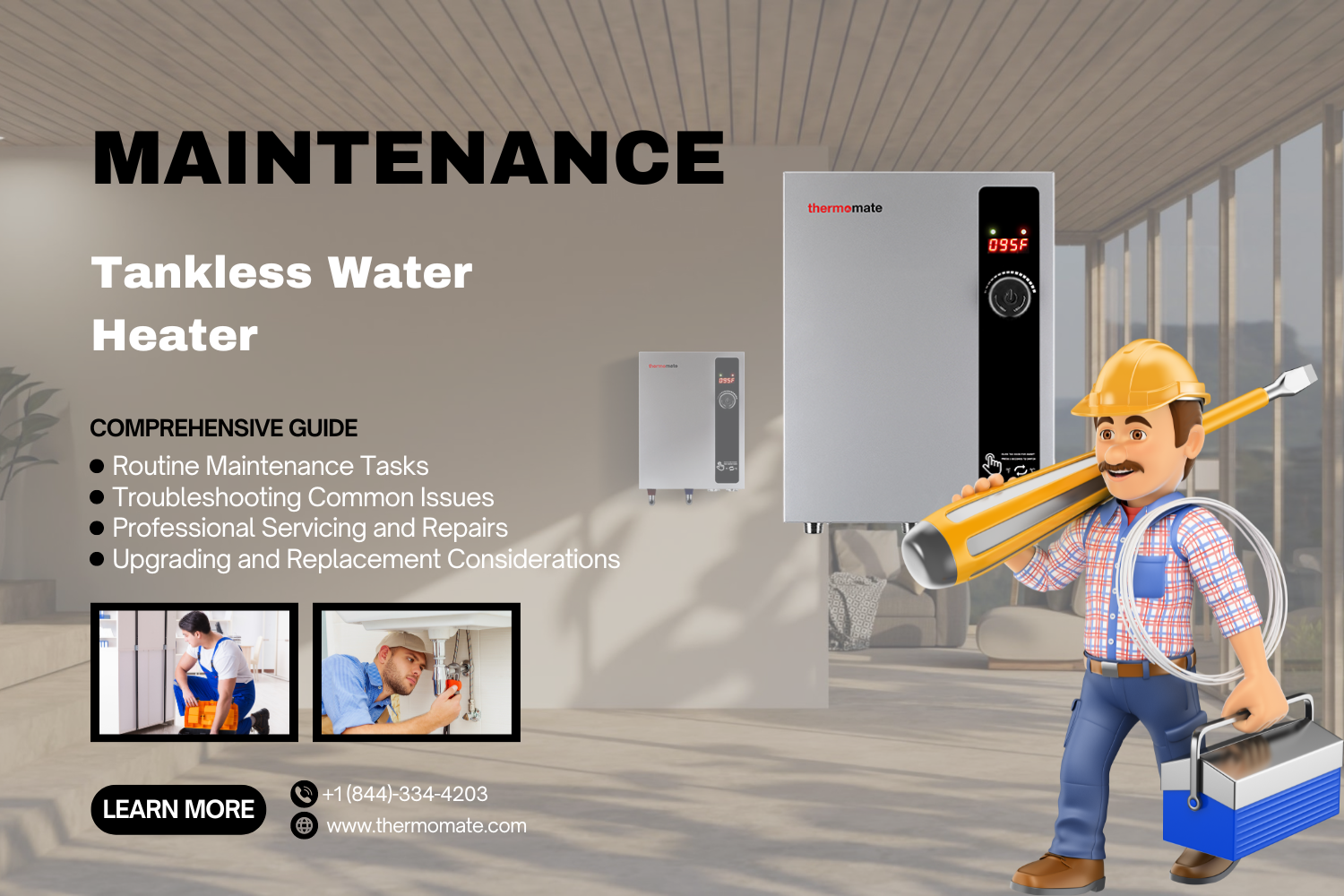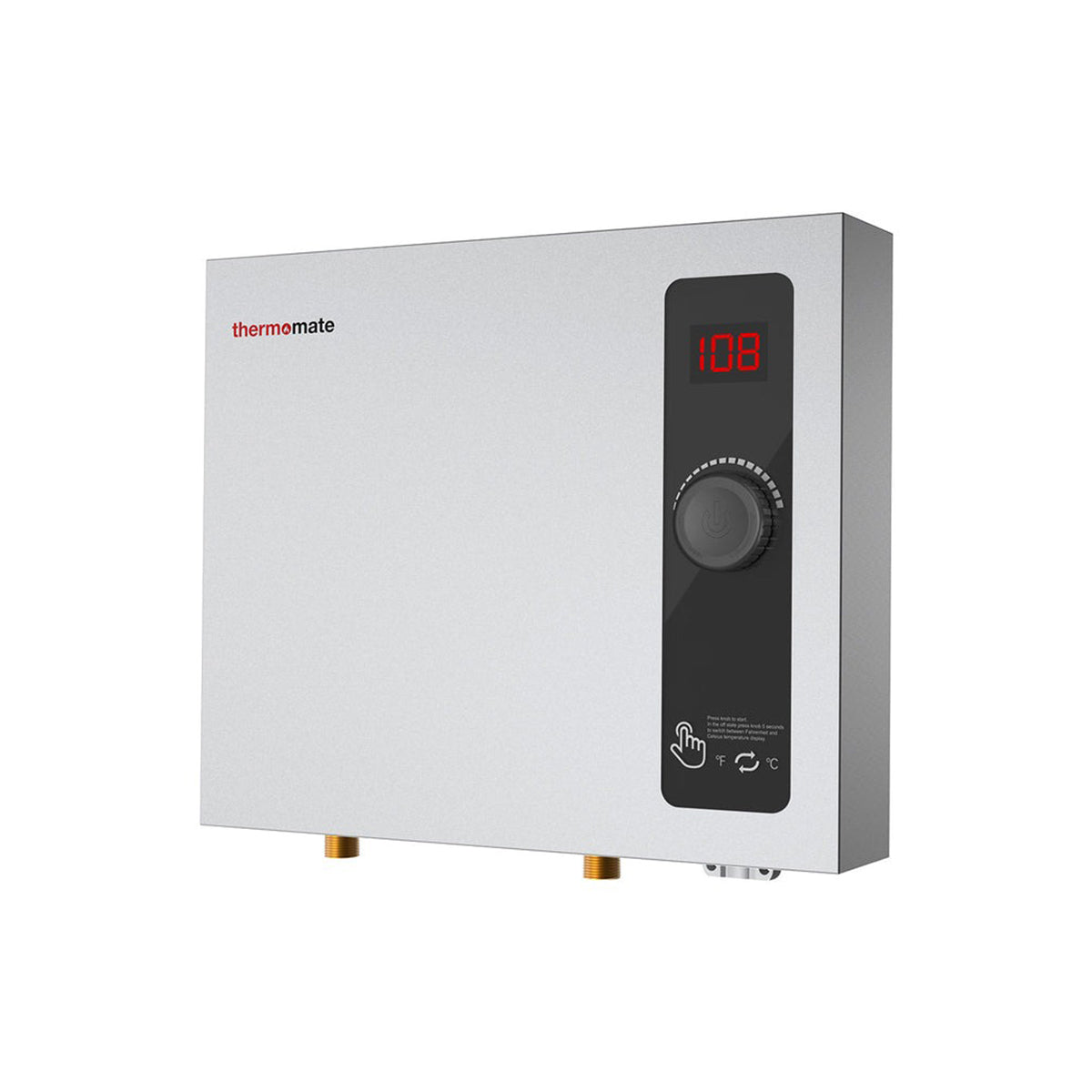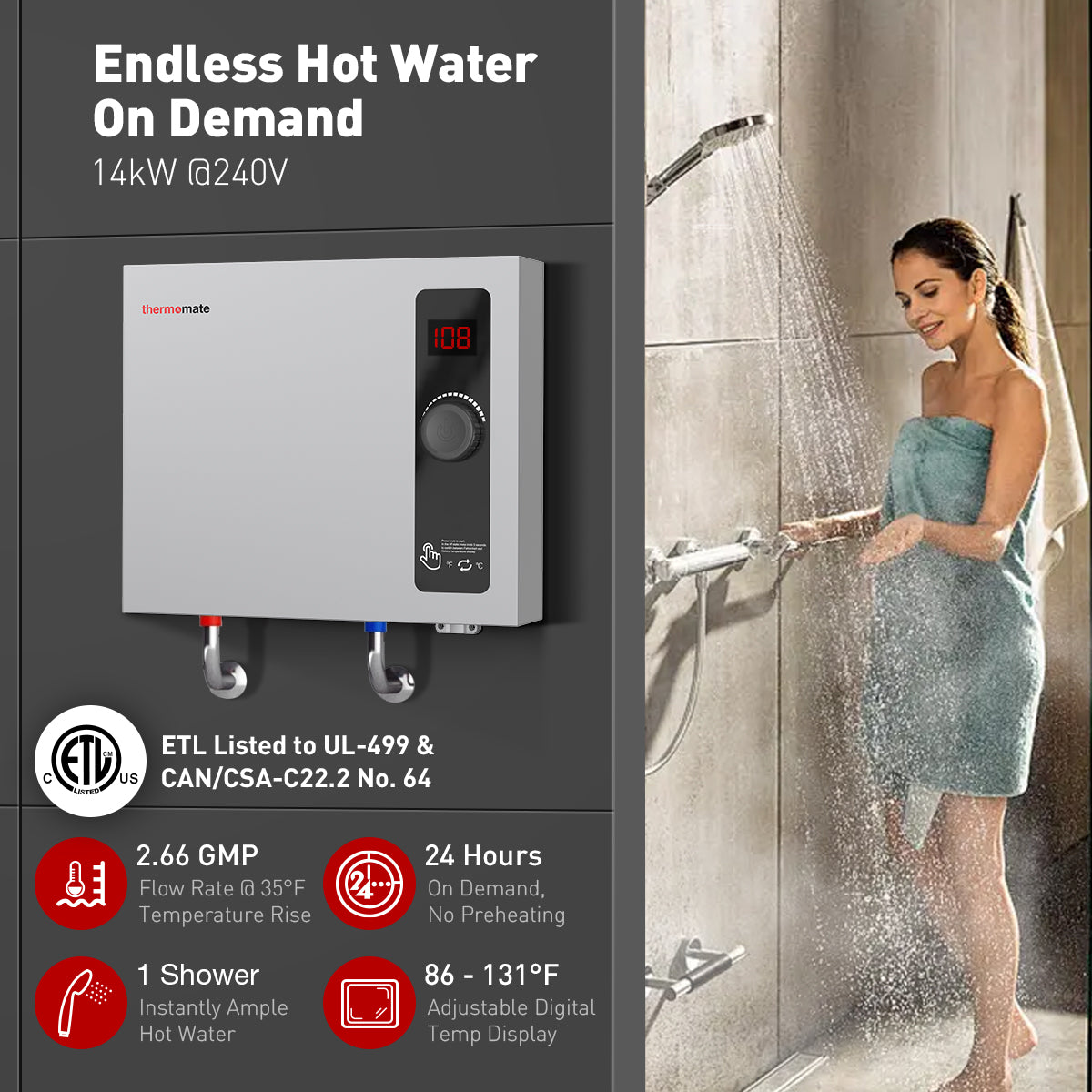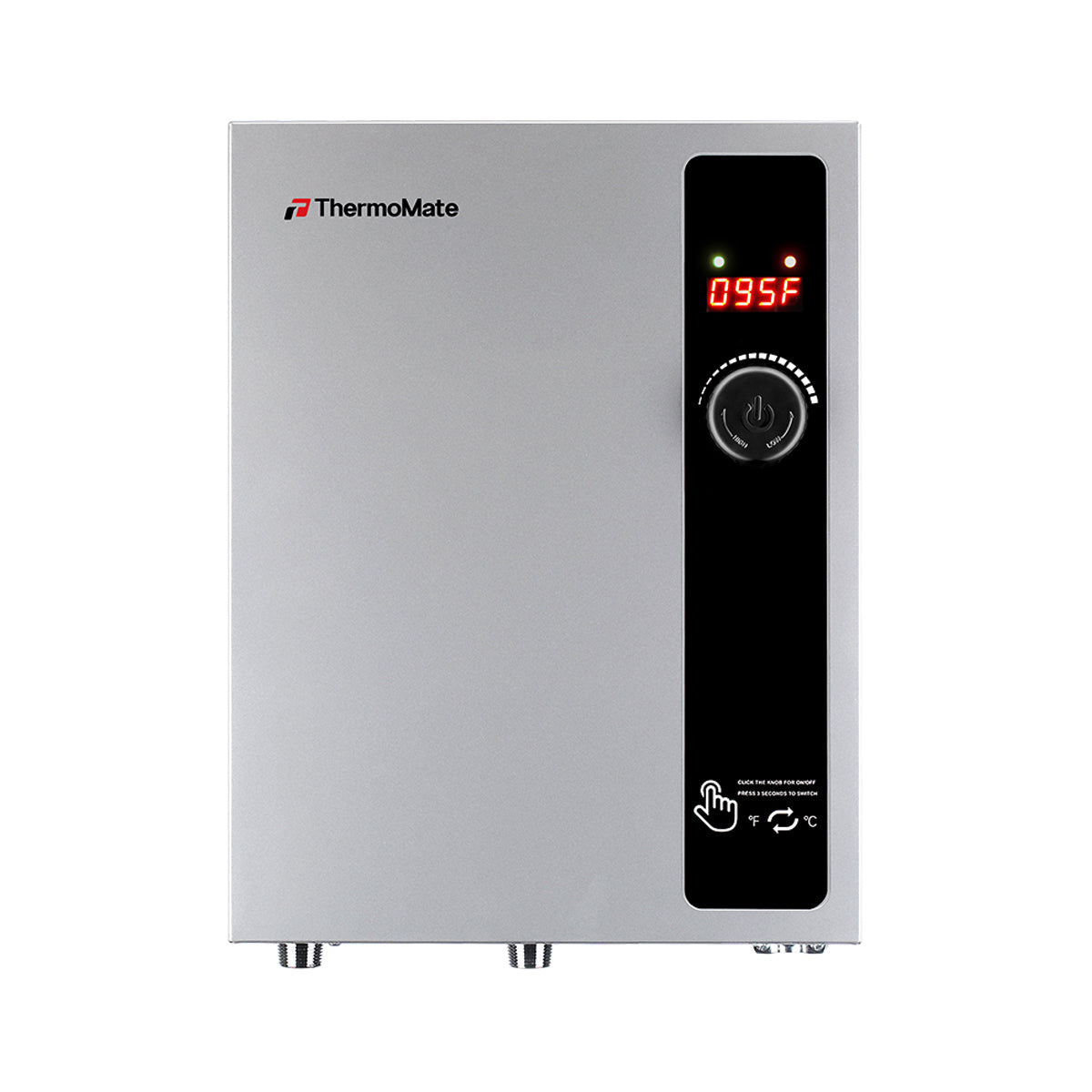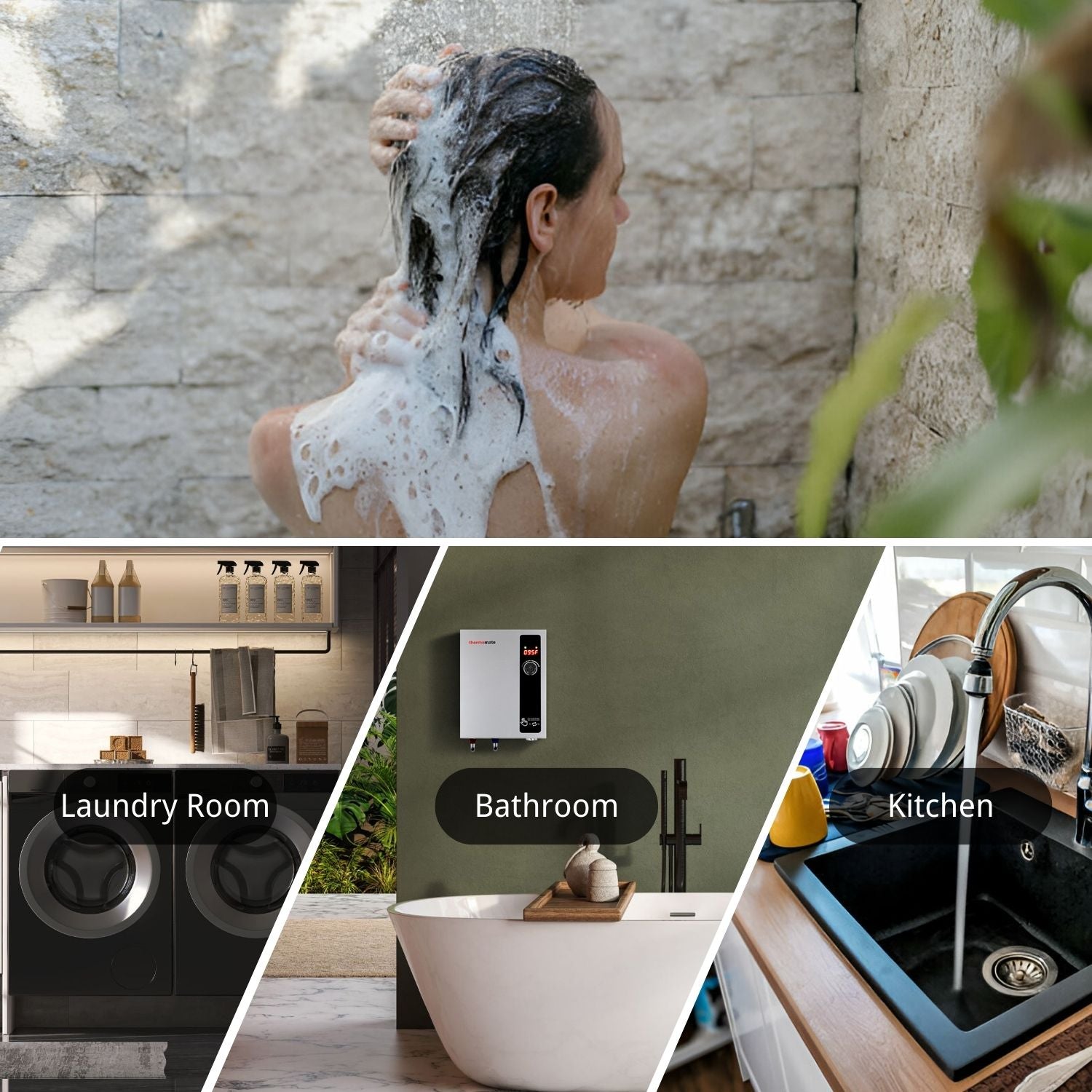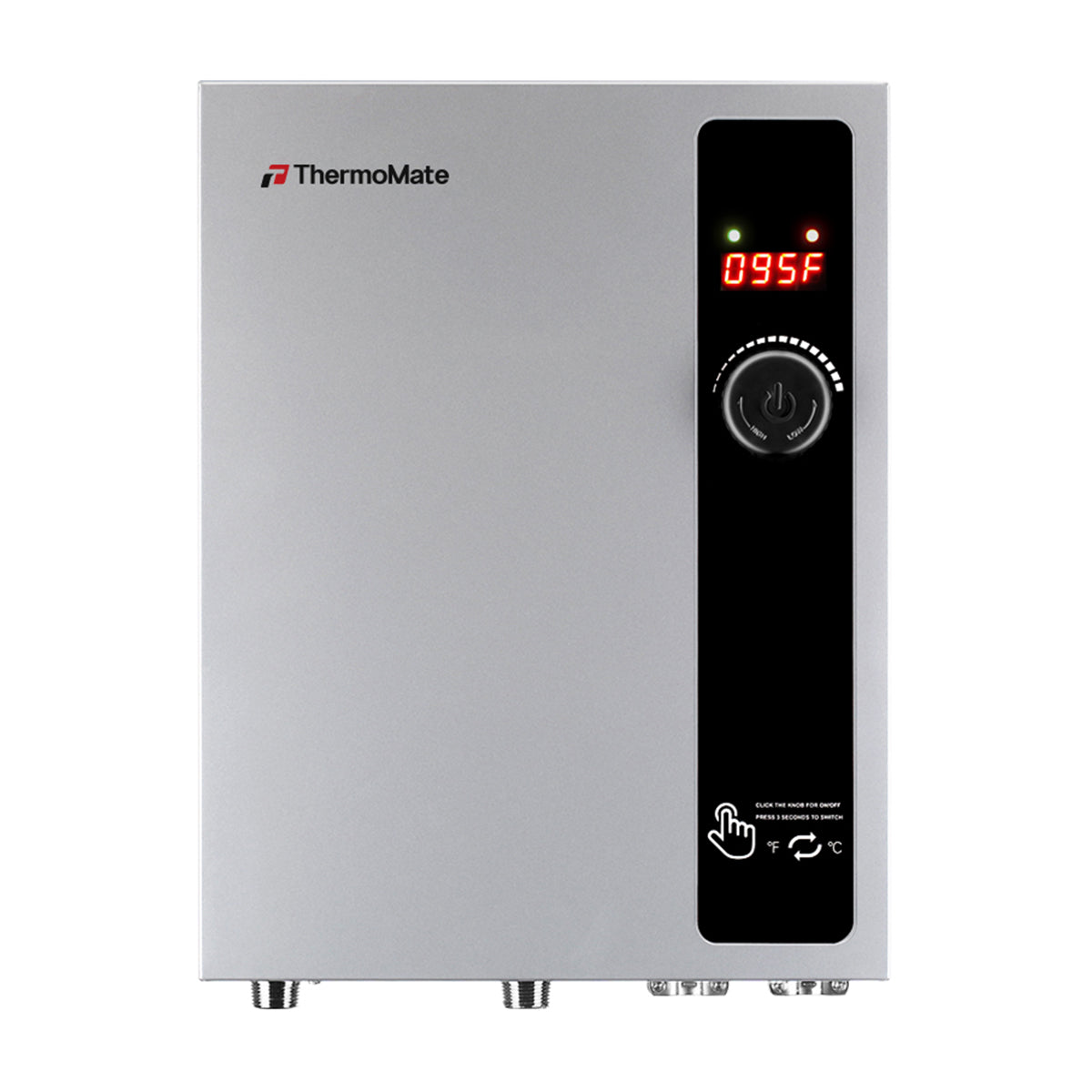Tankless electric water heaters are a modern solution for providing hot water on demand without the standby energy losses associated with traditional tank heaters. This guide offers a detailed look at how to maintain these efficient devices, ensuring they operate at peak performance for years to come. From understanding the basics of your water heater to performing routine maintenance and troubleshooting common issues, we cover all the essential aspects to help you get the most out of your investment.
Key Takeaways
- Understanding the components and functionality of your tankless electric water heater is crucial for proper maintenance and troubleshooting.
- Regular maintenance tasks such as cleaning the inlet screen filter, inspecting for leaks and corrosion, and flushing the system are key to longevity and efficiency.
- Being able to identify and address common issues like inconsistent water temperature and low water pressure can save you time and money.
- Knowing when to call a professional for servicing and repairs is important to prevent further damage and ensure safety.
- Considering factors such as energy efficiency and modern features can guide decisions on upgrading or replacing your tankless electric water heater.
Understanding Your Tankless Electric Water Heater
Components and Functionality
A tankless electric water heater is a marvel of modern engineering, designed to provide hot water on demand without the need for a bulky storage tank. Understanding the components and functionality of your unit is crucial for efficient operation and longevity.
The core components include the heating element, flow sensors, control panel, and heat exchanger. Each plays a vital role in the heating process:
- Heating Element: Converts electrical energy into heat.
- Flow Sensors: Detect water flow and activate the heater.
- Control Panel: Allows users to set and adjust temperature settings.
- Heat Exchanger: Transfers heat to the water as it passes through.
Regular maintenance of these components is essential to ensure your tankless water heater operates at peak efficiency and to prevent premature wear and tear.
When considering a new unit, it's important to note specifications such as wattage, material, and flow rate. For instance, a heater with 3500 watts and stainless steel material, capable of delivering a flow rate between 0.40-0.66 GPM, represents a robust and efficient model. Always consider additional factors such as shipping options, payment methods, and return policies before making a purchase.
Benefits of Going Tankless
Switching to a tankless electric water heater comes with a multitude of advantages. Energy efficiency is one of the most significant benefits, as these units only heat water when it's needed, leading to potential savings on your utility bills. Unlike traditional water heaters that keep a large tank of water hot at all times, tankless models provide instant unlimited hot water on demand, ensuring that you never run out.
Another key advantage is the stable temperature control that tankless heaters offer. They are designed with self-modulating power technology, which adjusts energy usage based on the flow rate of water, maintaining a consistent temperature output. This feature is not only convenient but also contributes to the overall energy savings.
The compact design of tankless water heaters is a game-changer for homeowners looking to maximize their space. Easy installation and a smaller footprint mean that you can reclaim the area typically occupied by a bulky tank.
Lastly, the longevity of tankless water heaters often surpasses that of traditional models. With proper maintenance, they can last up to 20 years, making them a wise investment for the long term.
Safety and Compliance Standards
Ensuring the safety of your tankless electric water heater is paramount. All units should comply with local and national safety standards to guarantee safe operation. This includes adherence to electrical codes, proper installation by a certified technician, and regular maintenance checks.
It's crucial to be aware of the certifications that a quality tankless water heater should possess. For instance, a UL certification indicates that the unit has been tested for safety by a recognized laboratory.
Remember, a safe water heater is one that is regularly inspected and maintained. Neglecting these aspects can lead to hazardous situations, including electrical hazards and water damage.
Below is a list of common certifications and standards that you should look for when purchasing or maintaining a tankless electric water heater:
- UL Certified
- ETL Listed
- Energy Star Rated
- National Electric Code (NEC) Compliant
These certifications ensure that the heater meets specific safety and efficiency criteria, providing peace of mind and potentially saving on energy costs.
Routine Maintenance Tasks
Cleaning the Inlet Screen Filter
Maintaining a clean inlet screen filter is crucial for the efficient operation of your tankless electric water heater. Over time, debris and sediment can accumulate, leading to reduced water flow and potential damage to the unit. Regular cleaning ensures optimal performance and longevity.
To clean the inlet screen filter, follow these simple steps:
- Turn off the power to the water heater.
- Close the water valves to prevent water from entering the unit.
- Remove the inlet screen filter carefully.
- Rinse the filter under running water to remove debris.
- If necessary, use a soft brush to gently clean the filter.
- Reinstall the filter and open the water valves.
- Turn the power back on and check for proper operation.
It's recommended to perform this maintenance task at least once a year or more frequently if you have hard water or notice a decrease in water flow.
By keeping the inlet screen filter clean, you not only ensure a consistent supply of hot water but also protect the internal components of your heater, such as the heating elements, from premature wear. Remember, a well-maintained water heater is more likely to operate efficiently and can help avoid unexpected repairs or replacements.
Inspecting for Leaks and Corrosion
Regular inspection for leaks and corrosion is crucial to the longevity of your tankless electric water heater. Check all connections and fittings periodically to ensure they are secure and free of rust or mineral deposits. Look for any signs of moisture or drips that could indicate a leak. If you find any, address them promptly to prevent further damage.
- Turn off the power and water supply before beginning your inspection.
- Visually examine the heater's exterior and interior components for any signs of wear or damage.
- Use a flashlight to inspect hard-to-see areas.
- Check for discoloration, warping, or pitting on surfaces as these can be signs of corrosion.
It's important to maintain a regular inspection schedule. Catching issues early can save on costly repairs and extend the life of your heater.
If you're unsure about what to look for or how to fix any issues you find, consult the manufacturer's manual or contact a professional. Remember, a well-maintained heater is more efficient and can provide consistent performance for years to come.
Flushing the System to Remove Scale Buildup
Over time, minerals in the water can cause scale buildup inside your tankless electric water heater, which can affect its efficiency and longevity. Flushing the system regularly is essential to maintain optimal performance. This process involves circulating a descaling solution through the unit to dissolve and flush out the mineral deposits.
To properly flush your system, follow these steps:
- Turn off the power to the water heater.
- Close the incoming water valve to isolate the unit.
- Attach a hose to the service valve and use a submersible pump to circulate the descaling solution.
- After flushing, thoroughly rinse the system with clean water to remove any remaining solution.
Remember to always consult your owner's manual for specific instructions and safety precautions before starting the flushing process.
Additionally, here are some tips to prevent scale buildup and maintain your unit's efficiency:
- Use a pre-filter to reduce sediment entering the system.
- Soften hard water with a water softener to minimize mineral content.
- Schedule regular maintenance checks to identify issues early.
Troubleshooting Common Issues
Inconsistent Water Temperature
Experiencing inconsistent water temperatures can be one of the most common issues with tankless electric water heaters. This problem can often be attributed to several factors, ranging from simple user errors to more complex system malfunctions.
- Check the power supply and ensure that the water heater is receiving consistent voltage.
- Examine the temperature settings on the unit to confirm they are set correctly.
- Look for any signs of mineral scale buildup, which can affect the heating elements and water flow.
Inconsistent temperatures may also result from an overtaxed system. If multiple appliances are using hot water simultaneously, the heater may struggle to maintain the set temperature.
Regular maintenance, such as flushing the system to remove scale buildup, can prevent many of these issues. However, if the problem persists, it may be indicative of a more serious issue, such as a malfunctioning heating element or a faulty thermostat. In such cases, consulting the user manual or seeking professional assistance is advisable.
Low Water Pressure Problems
Experiencing low water pressure from your tankless electric water heater can be frustrating and may indicate an issue that needs attention. One common cause is a clogged inlet screen filter, which can restrict water flow. Regularly cleaning the filter is a simple maintenance task that can prevent this problem.
Another potential cause could be the build-up of scale within the unit. This is especially common in areas with hard water. Flushing the system periodically is recommended to remove any mineral deposits that could be affecting performance.
If you notice a sudden drop in water pressure, it's important to investigate promptly to avoid further complications.
Lastly, ensure that your unit is adequately sized for your home's demand. A unit that is too small may struggle to provide sufficient water pressure, especially during peak usage times.
Error Codes and What They Mean
Tankless electric water heaters are designed with a self-diagnostic system that displays error codes to alert you of potential issues. Understanding these codes is crucial for troubleshooting problems and ensuring your unit operates efficiently. Below is a list of common error codes and their meanings:
- E0/E1/E2/E3: Flow sensor failure - The flow of water is not being detected accurately.
- HH: High temperature cutoff - The water temperature has exceeded safe limits.
- E4: The inlet and outlet pipes are reversed - The unit is unable to heat the water.

Remember, while some error codes can be resolved with simple resets or adjustments, others may indicate a more serious issue that requires professional attention.
It's important to consult your owner's manual for a complete list of error codes specific to your model. If you encounter an error code that persists after basic troubleshooting, it's advisable to contact a qualified technician to diagnose and resolve the issue.
Professional Servicing and Repairs
When to Call a Professional
While many maintenance tasks for your tankless electric water heater can be performed by homeowners, there are times when it's best to call in a professional. If you encounter complex issues, such as internal component failures or persistent error codes, professional assistance is crucial.
- When you're unsure about the nature of the problem.
- If the water heater is still under warranty, as DIY repairs might void it.
- When dealing with electrical components, to avoid the risk of shock.
- If local codes require licensed servicing for certain repairs.
Remember, a professional technician not only resolves the issue but also ensures that your system operates safely and efficiently. This can prevent future problems and extend the lifespan of your unit.
It's also important to consider the long-term benefits of professional servicing. A well-maintained water heater is more likely to perform at optimal efficiency, which can translate into energy savings and a reduced environmental impact. When in doubt, consult with a professional to maintain the integrity and performance of your tankless electric water heater.
Finding a Qualified Technician
When your tankless electric water heater requires servicing beyond routine maintenance, it's crucial to enlist the help of a qualified technician. Certification and experience are key indicators of a technician's ability to handle your unit's specific needs.
To ensure you're choosing the right professional, consider the following steps:
- Verify the technician's certifications, ensuring they are recognized by industry standards.
- Check for reviews or testimonials from previous customers.
- Confirm that they have experience with your particular brand and model of water heater.
- Inquire about their warranty and guarantee policies on the work performed.
Remember, a reputable technician should be transparent about their qualifications and willing to provide references upon request. Choosing the right professional can prevent future issues and ensure the longevity of your water heater.
Understanding Service Costs
When considering professional servicing for your tankless electric water heater, it's important to have a clear understanding of the potential costs involved. Service costs can vary widely based on the type of service, the complexity of the issue, and the rates of the technician. It's advisable to obtain multiple quotes to ensure you are getting a fair price for the service provided.
- Initial diagnostic fee
- Hourly labor rates
- Cost of replacement parts
- Additional charges for emergency services or after-hours work
Remember, regular maintenance can help prevent costly repairs down the line. Investing in routine checks and cleaning can save you money and extend the life of your heater.
Before committing to a service, ask for a detailed breakdown of the costs. This transparency allows you to understand exactly what you are paying for and helps to avoid any unexpected charges. Always ensure that the technician is qualified and experienced with electric water heaters, as this expertise can lead to more efficient and effective repairs.
Upgrading and Replacement Considerations
When to Consider Upgrading
Upgrading your tankless electric water heater can lead to improved efficiency, better temperature control, and overall savings on utility bills. Consider upgrading if your current unit is over 10 years old, as newer models are likely to have advanced features that can enhance your home's energy management.
- Performance degradation: If you notice a consistent drop in water temperature or increased heating times, your heater may be losing efficiency.
- Rising energy bills: An older unit may consume more electricity to deliver the same amount of hot water, reflecting in higher energy costs.
- Frequent repairs: As your water heater ages, it may require more frequent repairs, which can be more costly in the long run compared to investing in a new unit.
Upgrading to a model like the tankless electric on-demand hot water heater with 240V and 18KW capacity can provide instant hot water and smart operation, which not only saves money and space but also includes enhanced safety features.
Energy Efficiency and Modern Features
Upgrading to a modern tankless electric water heater can significantly enhance energy efficiency and introduce cutting-edge features to your home's hot water system. Modern units are designed to be more energy-efficient, often exceeding the performance of traditional tank models. This efficiency translates into lower operating costs and a reduced environmental footprint.
- Self-modulating technology adjusts energy usage to match demand, ensuring no energy is wasted.
- Wi-Fi connectivity allows for remote monitoring and control, providing convenience and further energy savings.
- Digital displays offer precise temperature control and usage tracking, making it easier to optimize settings for efficiency.
Upgrading is not just about energy savings; it's also about embracing features that offer greater control and convenience. The integration of smart technology into tankless water heaters is a game-changer, allowing users to manage their systems with unprecedented ease.
When considering an upgrade, it's important to evaluate the type, size, and efficiency of the new unit. These factors will determine the overall cost savings and comfort level provided by the heater. Remember, a more efficient unit can contribute to significant long-term savings on your energy bills.
Disposal of Your Old Unit
When the time comes to dispose of your old tankless electric water heater, it's important to do so responsibly. Local regulations and guidelines should be your first point of reference to ensure proper disposal practices. Many areas have specific protocols for disposing of electrical appliances to minimize environmental impact.
- Contact local waste management authorities for disposal instructions.
- Inquire about recycling programs for electrical appliances.
- Ensure that the unit is completely disconnected and drained before disposal.
Remember, improper disposal can lead to environmental hazards and may be illegal in some jurisdictions. It's crucial to follow the correct procedures to avoid potential fines and contribute to environmental sustainability.
If you're replacing your old unit with a new model, consider the efficiency and space-saving benefits of modern tankless water heaters. Some, like the thermomate options, offer features such as auto-adjusting for optimal efficiency, which can be a significant upgrade from your old system.
When considering the upgrade or replacement of your heating and cooking appliances, it's essential to choose products that not only meet your needs but also offer efficiency and reliability. At Thermomate, we provide a wide range of high-quality kitchen appliances and electric heating solutions that cater to both residential and commercial spaces. Don't miss out on our exclusive deals and professional support. Upgrade your home with confidence by visiting our website and exploring our latest collection of electric water heaters, cooktops, and more. Make the smart choice today and ensure a warm and welcoming environment for all your spaces.

Conclusion
Maintaining your tankless electric water heater is crucial for ensuring its longevity and efficiency. Throughout this comprehensive guide, we've explored the importance of regular maintenance, the steps for routine upkeep, troubleshooting common issues, and when to seek professional help. By adhering to the maintenance tips and best practices outlined, you can enjoy a continuous supply of hot water, prevent unexpected breakdowns, and save on energy costs. Remember that while some maintenance tasks can be performed by homeowners, others may require the expertise of a qualified technician. Stay proactive in your maintenance routine, and your tankless electric water heater will serve you well for years to come.
Frequently Asked Questions
How often should I perform maintenance on my tankless electric water heater?
Routine maintenance tasks such as cleaning the inlet screen filter and inspecting for leaks should be done every 6 months. Flushing the system to remove scale buildup should be done at least once a year or more frequently if you have hard water.
What are the signs that my tankless water heater needs servicing?
Common signs that your tankless water heater may need servicing include inconsistent water temperatures, low water pressure, visible leaks or corrosion, and error codes displayed on the unit.
Can I flush the scale buildup from my water heater myself?
Yes, you can flush the scale buildup from your tankless water heater yourself if you are comfortable with the process and have the necessary equipment. However, if you're unsure, it's best to contact a professional.
What are the benefits of upgrading to a newer tankless electric water heater?
Upgrading to a newer model can offer improved energy efficiency, advanced features such as smart controls, and potentially a longer lifespan and better performance.
How do I dispose of my old tankless water heater?
You should check with local regulations for proper disposal of your old unit. Many areas have specific guidelines for recycling or disposing of electrical appliances. A qualified technician can also advise you on proper disposal.
Are tankless electric water heaters safe?
Yes, tankless electric water heaters are safe when installed and maintained correctly. They must comply with safety and compliance standards, and it's important to follow the manufacturer's guidelines and local building codes.
Learn More About: Tankless Electric Water Heater: What You Need to Know Before You Buy

